A recent study by Klick Labs introduces an innovative method that combines voice technology with artificial intelligence (AI) for detecting Type 2 diabetes.
The research used short voice recordings and basic health information like age, gender, height, and weight to train an AI model to identify Type 2 diabetes. The model exhibited 89 percent accuracy for women and 86 percent for men.
"Our research highlights significant vocal variations between individuals with and without Type 2 diabetes and could transform how the medical community screens for diabetes," said Jaycee Kaufman, first author of the paper and research scientist at Klick Labs.
"Current methods of detection can require a lot of time, travel, and cost. Voice technology has the potential to remove these barriers entirely," she added.

A woman with diabetes uses a glucometer to measure the glycemia in her blood in Paris on March 24, 2020, on the eighth day of a strict lockdown in France aimed at curbing the spread of COVID-19 caused by the novel coronavirus.
Voice Tech, AI Used to Detect Type 2 Diabetes
In the study, 267 participants, classified as non-diabetic or Type 2 diabetic, were instructed to record a specific phrase on their smartphones six times daily for two weeks.
With over 18,000 audio recordings, researchers meticulously analyzed 14 acoustic features to discern distinctions between non-diabetic and Type 2 diabetic individuals.
Jaycee Kaufman emphasized the potential of this research in transforming diabetes screening. The technology offers a streamlined and accessible alternative to current detection methods, which often involve significant time, expense, and travel.
The research delved into various vocal attributes, including imperceptible alterations in pitch and intensity. Signal processing techniques were employed to capture voice changes associated with Type 2 diabetes. Notably, these vocal variations manifested differently in males and females.
Globally, nearly half of the 240 million adults with diabetes are unaware of their condition, and Type 2 diabetes constitutes approximately 90 percent of cases, according to the International Diabetes Federation.
Standard diagnostic tests for prediabetes and Type 2 diabetes entail the glycated hemoglobin (A1C) test, fasting blood glucose (FBG) test, and the OGTT, all of which necessitate a visit to a healthcare provider.
Read Also: Global Shortage of Diabetes Medicine 'Ozempic' Could Persist for a Longer Time, Experts Claim
Klick's Non-Invasive Approach to Screen Cases of Type 2 Diabetes
Yan Fossat, Vice President of Klick Labs and principal investigator of the study, highlighted the potential of Klick's non-invasive approach to screening large populations and identifying undiagnosed cases of Type 2 diabetes. This method opens the door to a more accessible and affordable digital screening tool.
"Our research underscores the tremendous potential of voice technology in identifying Type 2 diabetes and other health conditions," Fossat said. "Voice technology could revolutionize healthcare practices as an accessible and affordable digital screening tool," he added.
Fossat outlined future steps, including replicating the study and extending research into voice-based diagnostics for prediabetes, women's health, and hypertension.
This latest discovery stemmed from Klick Labs' more than a decade of expertise and investment in machine learning, data science, and AI across several therapeutic areas, particularly in diabetes research.
Their 2020 study, "Homeostasis as a proportional-integral control system," published in Nature Digital Medicine, also explored mathematical modeling to determine changes in how glucose is regulated. Their most recent study was published in Mayo Clinic Proceedings: Digital Health.
Related Article: Revolutionary GlucoScreen: Smartphone-Based System for Early Detection of Prediabetes










